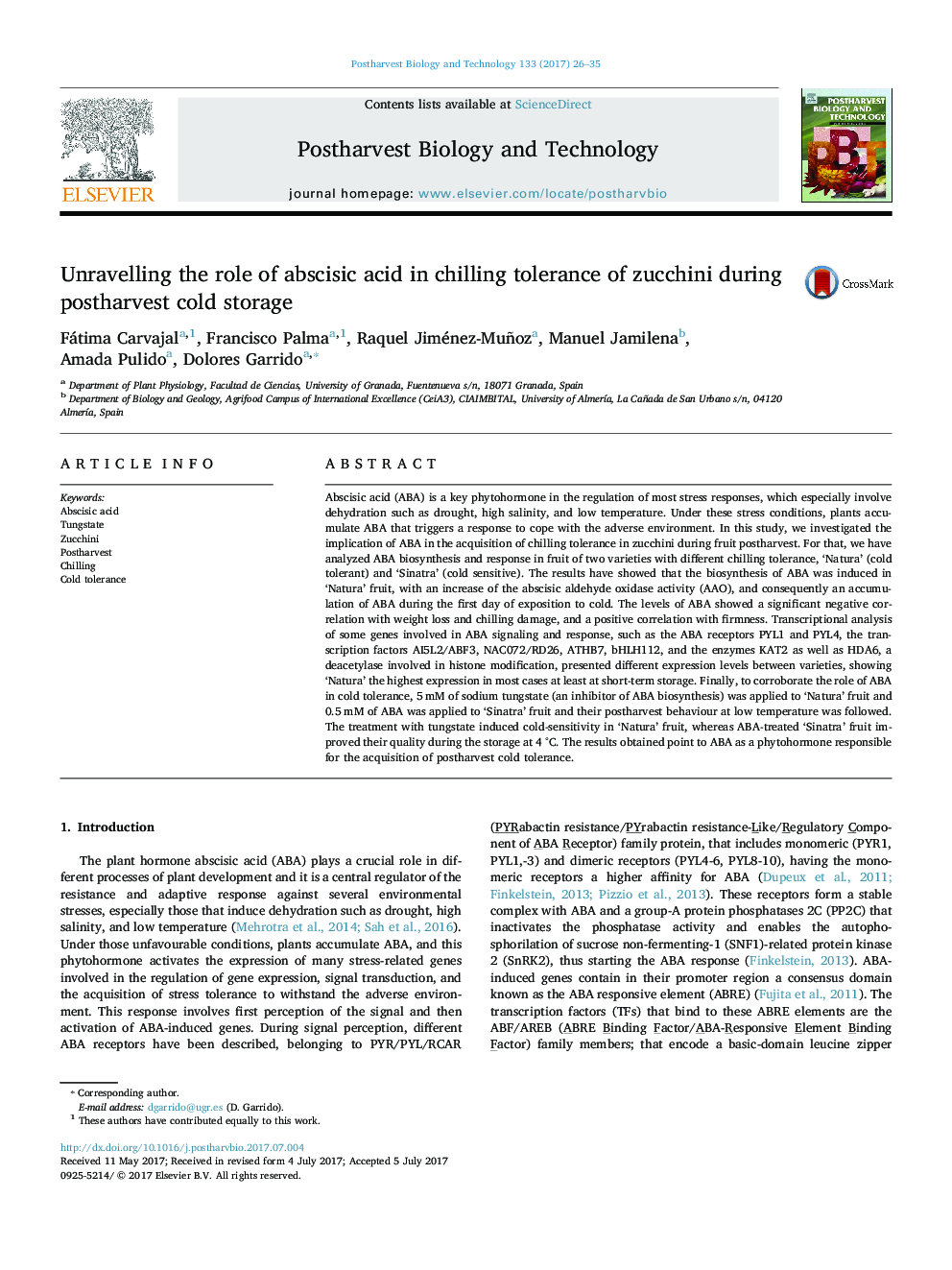| کد مقاله | کد نشریه | سال انتشار | مقاله انگلیسی | نسخه تمام متن |
|---|---|---|---|---|
| 5762645 | 1624961 | 2017 | 10 صفحه PDF | دانلود رایگان |
عنوان انگلیسی مقاله ISI
Unravelling the role of abscisic acid in chilling tolerance of zucchini during postharvest cold storage
ترجمه فارسی عنوان
تجزیه و تحلیل نقش اسید آووکادیک در تحمل شل شدن کدو سبز در زمان ذخیره سازی سرد بعد از گلدهی
دانلود مقاله + سفارش ترجمه
دانلود مقاله ISI انگلیسی
رایگان برای ایرانیان
کلمات کلیدی
موضوعات مرتبط
علوم زیستی و بیوفناوری
علوم کشاورزی و بیولوژیک
علوم زراعت و اصلاح نباتات
چکیده انگلیسی
Abscisic acid (ABA) is a key phytohormone in the regulation of most stress responses, which especially involve dehydration such as drought, high salinity, and low temperature. Under these stress conditions, plants accumulate ABA that triggers a response to cope with the adverse environment. In this study, we investigated the implication of ABA in the acquisition of chilling tolerance in zucchini during fruit postharvest. For that, we have analyzed ABA biosynthesis and response in fruit of two varieties with different chilling tolerance, 'Natura' (cold tolerant) and 'Sinatra' (cold sensitive). The results have showed that the biosynthesis of ABA was induced in 'Natura' fruit, with an increase of the abscisic aldehyde oxidase activity (AAO), and consequently an accumulation of ABA during the first day of exposition to cold. The levels of ABA showed a significant negative correlation with weight loss and chilling damage, and a positive correlation with firmness. Transcriptional analysis of some genes involved in ABA signaling and response, such as the ABA receptors PYL1 and PYL4, the transcription factors AI5L2/ABF3, NAC072/RD26, ATHB7, bHLH112, and the enzymes KAT2 as well as HDA6, a deacetylase involved in histone modification, presented different expression levels between varieties, showing 'Natura' the highest expression in most cases at least at short-term storage. Finally, to corroborate the role of ABA in cold tolerance, 5 mM of sodium tungstate (an inhibitor of ABA biosynthesis) was applied to 'Natura' fruit and 0.5 mM of ABA was applied to 'Sinatra' fruit and their postharvest behaviour at low temperature was followed. The treatment with tungstate induced cold-sensitivity in 'Natura' fruit, whereas ABA-treated 'Sinatra' fruit improved their quality during the storage at 4 °C. The results obtained point to ABA as a phytohormone responsible for the acquisition of postharvest cold tolerance.
ناشر
Database: Elsevier - ScienceDirect (ساینس دایرکت)
Journal: Postharvest Biology and Technology - Volume 133, November 2017, Pages 26-35
Journal: Postharvest Biology and Technology - Volume 133, November 2017, Pages 26-35
نویسندگان
Fátima Carvajal, Francisco Palma, Raquel Jiménez-Muñoz, Manuel Jamilena, Amada Pulido, Dolores Garrido,
